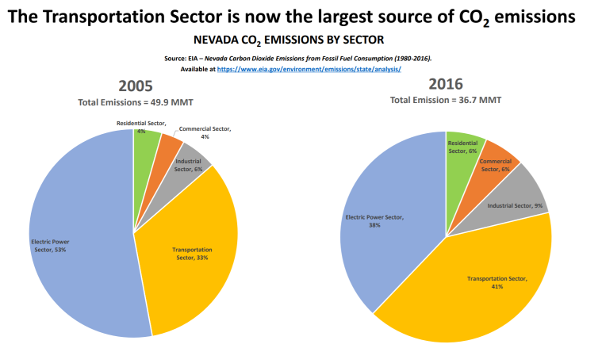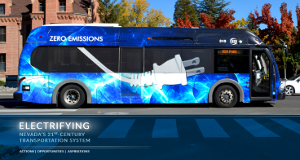By Jasmine Vazin and Brian Beffort
The Sierra Club Toiyabe Chapter is launching our Clean Transportation For All campaign, because it’s time to make transportation cleaner, healthier and more affordable. This blog discusses how we got here, why it matters, and how you can help.
Our country has been weaning off fossil fuel-powered electricity generation for more than a decade. Thanks partly to the work of Sierra Club’s Beyond Coal Campaign, more than 270 coal-fired power plants have retired, or are scheduled to retire.
More than 400 US Mayors have signed the Climate Mayors compact (thank you Reno’s Hillary Schieve).
Seven states, Puerto Rico, the District of Columbia, and more than 140 US cities and counties have made the ambitious commitment to 100% clean, renewable energy by 2050 (thank you, Nevada Legislature and Governor Sisolak).
With these improvements to America’s electricity production, the transportation sector is now the leading emitter of greenhouse gases and other pollution.

And unfortunately, these emissions and toxins are more concentrated and dangerous to people living in our cities:
-
8% of Nevadan kindergarteners were asthmatic in 2013, and asthma is the single leading cause of missed school days in the U.S.;
-
Las Vegas/Henderson area was ranked 13th in the country for high ozone level days in 2017;
-
In 2007, the economic costs of medical bills and missed school and work days due to asthma were valued at over $56 billion (higher now due to inflation);
-
Parts of Clark County have been out of attainment for the Clean Air Act ozone standards in 2018 and 2019, and transportation is the largest source of ozone emissions;
-
Mono Basin has also been out of attainment of the Clean Air Act particulate matter (PM10) standards since 1993, with transportation being a large source of PM pollution.
Our goals
If we prioritize clean air, there will be dramatic decreases in public health impacts almost immediately, and the best way to do that is to create a cleaner transportation sector. When the Clean Air Act was passed in the 1970s, air pollution improved quickly. If we act now, our families and communities could be breathing healthier air by the end of 2020, and our air quality could be significantly cleaner and healthier by 2025.
The technology exists to phase out fossil fuel-burning cars and create healthier, more livable communities. Here are some of our goals:
-
Improve air quality, because everyone has the right to breathe clean, healthy air;
-
Speed the transition from internal combustion engines to electric vehicles, not just for passenger cars, but delivery fleets, school buses and public transit;
-
Support the installation of EV chargers everywhere they’re needed—on our highways, at businesses, multi-family buildings and private residences;
-
Engage with planners and environmental champions in our communities to create walkable communities designed for people not cars, with public transit options so people don’t have to drive to meet their needs or conduct business;
-
Pursue financial incentives to help people from all backgrounds afford this transition to a 21st Century transportation economy—not just those who can afford Teslas and hip-district apartments;
Our legislatures have made strides in making cleaner transportation a state priority, but we need continued action at all levels of decision-making to improve the health of our neighborhoods through transportation reform.
The Toiyabe Chapter’s Clean Transportation for All campaign is aimed at ensuring that we all benefit from a 21st-century clean transportation system with access to cars, trucks, and buses that rely on little to no oil as well as to clean public transit— that centers around equity and justice.
How You Can Help
Join the Toiyabe Transportation Team. We’re holding our first call on November 20, 2019.
We’ll be laying out our view of what options lay ahead to change policy and improve our communities. Join the conversation to help us establish our priorities. Help form our campaign initiatives and organize within our community!
If you’re interested, contact the Clean Transportation For All Organizer Jasmine Vazin at Jasmine.Vazin@Sierraclub.org.

The report, Electrifying Nevada 21st Century Transportation System, commissioned by the Nevada Governor’s Office of Energy under Governor Brian Sandoval, provides a wealth of options to improve transportation outcomes in Nevada. Many of these efforts are taking place across the region, and the Toiyabe Chapter is working to accelerate these benefits. Join us!
More Grisly Details on Why This Matters
Even if you cannot smell air pollution, the effects can be severe and long lasting. Secondhand smoke is an obvious danger to respiratory health- but even on the seemingly clearest of days children are breathing in harmful air while waiting for the school bus or playing outside, especially around vehicle emissions like diesel school buses.
-
The American Heart Association’s State of the Air Report for 2019 ranked the Las Vegas/Henderson area 13th in the country for high ozone level days from 2015-2017.
-
Las Vegas and Reno experienced 65 and 21 code red or orange days respectively for ozone pollution during the same time period. Ground level ozone, or smog, is a result of reactions with diesel combustion byproducts, and while ozone is beneficial in the atmosphere, it is extremely dangerous to human health. Inhalation of ozone can lead to constricted airways, cough and sore throat, long term lung damage, COPD, asthma, and the aggravation of existing lung diseases.
-
Particulate matter (known as PM2.5 of PM10), or micro-particulates that are released from cars, can penetrate lung tissue and enter the bloodstream; decreasing lung function, contributing to asthma, irregular heartbeat, heart attacks, and shorter life spans.
-
Carbon monoxide, a direct byproduct of fuel combustion, enters the body through the lungs and enters the bloodstream, limiting the blood's capacity to transfer oxygen. Inhalation of carbon monoxide can lead to impaired concentration, slow reflexes, confusion, and death.
-
The EPA has estimated that the increases in air pollution from 2016 to 2018 contributed to 10,000 premature deaths nationwide, but this extreme outcome isn’t the only impact air pollution has on society.
-
In 2013, over 13.8 million missed school days were reported due to asthma, and in 2007 the economic costs of medical bills and missed school and work days due to this disease were valued at over $56 billion. The Nevada Department of Health found that in 2013 7.5% of all entering kindergarteners reported having asthma, and one fourth of highschool aged children reported having a diagnosis of the disease.
-
Recent research has shown that higher exposures to ultra-fine particles (UFPs) produced by fuel-burning, particularly diesel vehicles, significantly increase people’s chances of getting brain cancer.
-
The U.S. has seen severe declines in air quality over the last three years after decades of improvement, and there will be casualties as a direct result of poor air quality.
The Inequity of Air Pollution
The ill effects of air pollution are being imparted unequally across socioeconomic status and race as well, with the most polluted areas often concentrated in low-income communities of color. In Nevada, the same department of health study found that of high schoolers with asthma, american indian/alaska natives (45.5%), black/african american (30.2 %) and multiple-race (31.3%) students had the highest rates of asthma compared with their peers. Multiple studies (here and here) nationwide have also found inequality in concentrations of air pollutants by race, and air pollution disparities are a pervasive environmental justice issue that must be acknowledged when planning solutions.
The Toiyabe Chapter’s Clean Transportation For All Campaign is dedicated to improving all these outcomes, so we can all breathe healthier air and live in safer, happier communities.